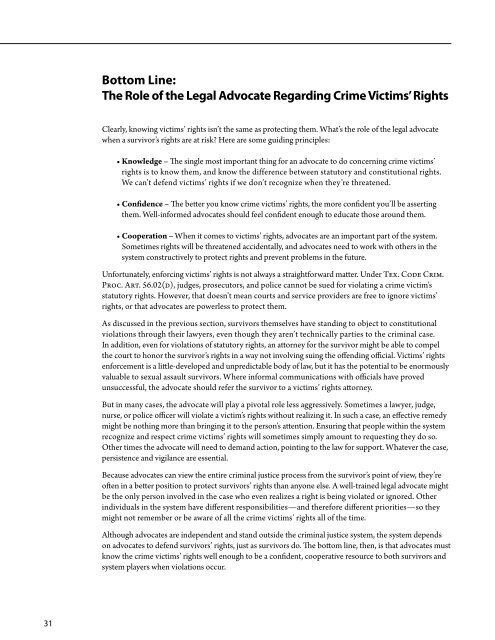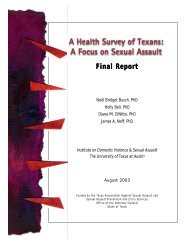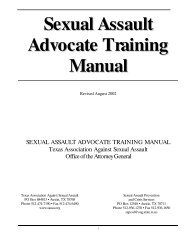Sexual aSSault LEGAL ADVOCACY MANUAL - Texas Association ...
Sexual aSSault LEGAL ADVOCACY MANUAL - Texas Association ...
Sexual aSSault LEGAL ADVOCACY MANUAL - Texas Association ...
Create successful ePaper yourself
Turn your PDF publications into a flip-book with our unique Google optimized e-Paper software.
Bottom Line:<br />
The Role of the Legal Advocate Regarding Crime Victims’ Rights<br />
Clearly, knowing victims’ rights isn’t the same as protecting them. What’s the role of the legal advocate<br />
when a survivor’s rights are at risk? Here are some guiding principles:<br />
• Knowledge – The single most important thing for an advocate to do concerning crime victims’<br />
rights is to know them, and know the difference between statutory and constitutional rights.<br />
We can’t defend victims’ rights if we don’t recognize when they’re threatened.<br />
• Confidence – The better you know crime victims’ rights, the more confident you’ll be asserting<br />
them. Well-informed advocates should feel confident enough to educate those around them.<br />
• Cooperation – When it comes to victims’ rights, advocates are an important part of the system.<br />
Sometimes rights will be threatened accidentally, and advocates need to work with others in the<br />
system constructively to protect rights and prevent problems in the future.<br />
Unfortunately, enforcing victims’ rights is not always a straightforward matter. Under Tex. Code Crim.<br />
Proc. Art. 56.02(d), judges, prosecutors, and police cannot be sued for violating a crime victim’s<br />
statutory rights. However, that doesn’t mean courts and service providers are free to ignore victims’<br />
rights, or that advocates are powerless to protect them.<br />
As discussed in the previous section, survivors themselves have standing to object to constitutional<br />
violations through their lawyers, even though they aren’t technically parties to the criminal case.<br />
In addition, even for violations of statutory rights, an attorney for the survivor might be able to compel<br />
the court to honor the survivor’s rights in a way not involving suing the offending official. Victims’ rights<br />
enforcement is a little-developed and unpredictable body of law, but it has the potential to be enormously<br />
valuable to sexual assault survivors. Where informal communications with officials have proved<br />
unsuccessful, the advocate should refer the survivor to a victims’ rights attorney.<br />
But in many cases, the advocate will play a pivotal role less aggressively. Sometimes a lawyer, judge,<br />
nurse, or police officer will violate a victim’s rights without realizing it. In such a case, an effective remedy<br />
might be nothing more than bringing it to the person’s attention. Ensuring that people within the system<br />
recognize and respect crime victims’ rights will sometimes simply amount to requesting they do so.<br />
Other times the advocate will need to demand action, pointing to the law for support. Whatever the case,<br />
persistence and vigilance are essential.<br />
Because advocates can view the entire criminal justice process from the survivor’s point of view, they’re<br />
often in a better position to protect survivors’ rights than anyone else. A well-trained legal advocate might<br />
be the only person involved in the case who even realizes a right is being violated or ignored. Other<br />
individuals in the system have different responsibilities—and therefore different priorities—so they<br />
might not remember or be aware of all the crime victims’ rights all of the time.<br />
Although advocates are independent and stand outside the criminal justice system, the system depends<br />
on advocates to defend survivors’ rights, just as survivors do. The bottom line, then, is that advocates must<br />
know the crime victims’ rights well enough to be a confident, cooperative resource to both survivors and<br />
system players when violations occur.<br />
31
















